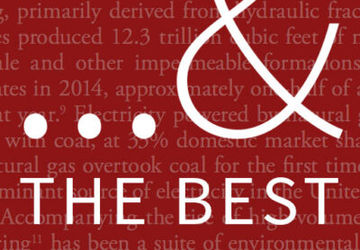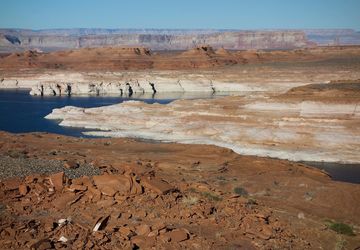On Tuesday, March 30, 2021, the Bill Lane Center, in partnership with the Hoover Institute, hosted the second of three programs making up the
Eighth State of the West symposium. The event takes stock of the economic and fiscal health of the western region, convening academic researchers, business/investment practitioners, and other stakeholders who offer expert analysis and opinions on some of the West’s most pressing challenges. While the first State of the West symposium of 2021 focused on
COVID-19, the most recent panels explored “Wildfires in the West” -- their causes and costs, as well as potential regional wildfire management solutions. Moderating the event was Prof. David Kennedy, c
o-founding director of the Bill Lane Center.
Panel 1: The Causes and Costs of Wildfire
In session one, “Causes and Costs,” Stephen Pyne, professor emeritus at Arizona State University, offered an overview of wildfire history, noting key fire events that have brought us to the present ‘Pyrocene Era.’ Pyne created the field of ‘fire history’ and coined the term ‘Pyrocene’ in 2015 to characterize the age in which we are currently living, one of rising global temperatures and wildfires on an unprecedented scale.
After Pyne’s historical overview, Kimiko Barrett, a research and policy analyst at Headwaters Economics, offered her take on the many challenges presented by wildfires, which are growing in duration, frequency and severity. With more people building in fire-prone areas, Barrett warned of increasing structure losses and fire danger resulting in fatalities. But, in an optimistic close to her presentation, Barrett offered this: “We know how to build smarter, safer homes. We can thoughtfully and deliberately think about how we live alongside wildfires with their ever-increasing risk.”
Prof. Kari Nadeau, director of the Sean N. Parker Center for Allergy and Asthma Research and a frequent partner of the Bill Lane Center on air quality and health projects, closed out the first panel. With sobering details on how wildfire smoke impacts human health, Nadeau’s presentation explored how people, flora and fauna are affected by wildfires and the 200-plus toxins found in the smoke.
“There are short and long-term health consequences from smoke exposure,” Nadeau explained. “You have particulate matter and larger particulates that get down into the trachea. Smaller organic compounds are the troublemakers that can get in and get picked up by your circulatory system.” Unfortunately, the chemicals from wildfire can impact the health of individuals even if the smoke is unseen, Nadeau said.
Like many of her fellow panelists, Nadeau expressed faith in fire mitigation measures that could control undergrowth and clean out forests so they are less dense. She added that data on prescribed burns shows that people don't have the same immune changes from prescribed burn smoke as they do from wildfire smoke exposure.
On policy changes that could reduce the harm caused by wildfires, the panelists all offered some promising guidance. "What can we do? We can mitigate by stopping or slowing global warming and creating greenhouse gas emissions,” said Nadeau. “We can build defenses and prepare for the consequences of climate change, and we can communicate with the communities that are likely to be affected."
Stephen Pyne noted that fires are interactive and require two easy human fixes: hardening our communities and improving our electric grid.
Kimiko Barrett added that a broader paradigm shift is needed to bring about real change: “I don't think we can rely on insurance companies to bail us out of this problem. They're a player at the table, but it comes down to all actors involved, including homeowners and local municipalities.” Barrett also remarked that, though unpopular, reversing the fiscal mechanisms in place at the federal level and compelling state and local governments to pay for firefighting instead could serve as an effective policy measure.
Panel 2: Lessons and Future Policy Challenges
Immediately following the first panel on wildfire’s causes and costs, a second panel of three distinguished speakers took up lessons learned and future policy challenges. First to present was Wade Crowfoot, appointed by Gavin Newsom in January of 2019 to serve as the secretary of the California Natural Resources Agency. Governor Jared Polis of Colorado followed, and Hilary Franz closed out the symposium, discussing her role as commissioner of Washington State’s Department of Natural Resources and her push to improve her state’s resilience in the face of climate change.
In California’s 170-year history, 17 of the 20 largest wildfires have occurred in the last two decades, the result of a warming climate and historical forest management practices. Crowfoot acknowledged the great challenge California faces, emphasizing solutions that increase coordination among local, state and federal agencies while providing more upfront investment in fire prevention: “We can’t respond our way out of this crisis,” he said. “Improving coordination between our U.S. Forest Service, the Bureau of Land Management, and other state agencies is critical...If we don't have our federal firefighters and state firefighters and forest managers working together, we are not actually going to address the crisis.”
Crowfoot also highlighted management practices that native people have used all along: “We need to reintroduce low-level prescribed fire, and that is a practice we learned from our tribal partners, that helped them steward California's environment since time immemorial,” he shared, noting that “there is cause for optimism.”
Governor of Colorado Jared Polis agreed that partnership between all agencies -- federal, state, intra-state and local -- is imperative for wildfire management, adding that the public plays an important role in this process too: “We have to act with urgency to quickly prevent fires from getting out of control. We have to have increased health practices and climate change mitigation, and an engaged and educated public.”
All panelists seemed to agree that time is of the essence. Communities can’t afford the losses to lives, property and infrastructure like those incurred during the 2018 Camp Fire in Paradise, California. “Removing toxins from the Camp Fire which destroyed Paradise cost over two billion dollars,” Crowfoot said. “That doesn't include the cost of rebuilding.”
Hilary Franz concurred: “We cannot constantly stay in a reactive state. We need to be proactive. Are we going to spend the money by throwing taxpayer dollars into flames, or are we going to invest upfront and restore the health of our forests to make them more resilient?" said the Commissioner of Public Lands, who administers six million acres of land and resources on behalf of the people Washington. "We believe we don't have any time to waste."
While both panels offered a troubling picture of an environmental problem that has spiraled out of hand, the expertise on the Zoom webinar also pointed to a future where stronger, more resilient communities are possible. Franz expressed optimism that her state had the blueprint and tools to better protect lives and property. With a good plan in place, “what we now need is action,” she said. “We have to expand and modify our wildfire response to keep fires small and contained. We have to invest in local firefighting resources. We have to invest in incident management teams.” Franz also insisted on the need for a trained workforce to not only conduct prescribed burns, but to manage forest floors as well. With an unemployment challenge and a need for more workers trained in wildfire control and prevention, there is an opportunity “to bridge that gap,” she stated.
With the scale of the wildfire predicament overwhelming response capacity, there was no question at the end of the Eighth State of the West Symposium that change will require an investment in proactive, wildfire-resilience behaviors. Along with improved coordination among all actors and stakeholders - homeowners, state and federal agencies, firefighters, forest managers and policymakers - these measures seem to offer great promise, even in the face of a frightening wildfire crisis.


